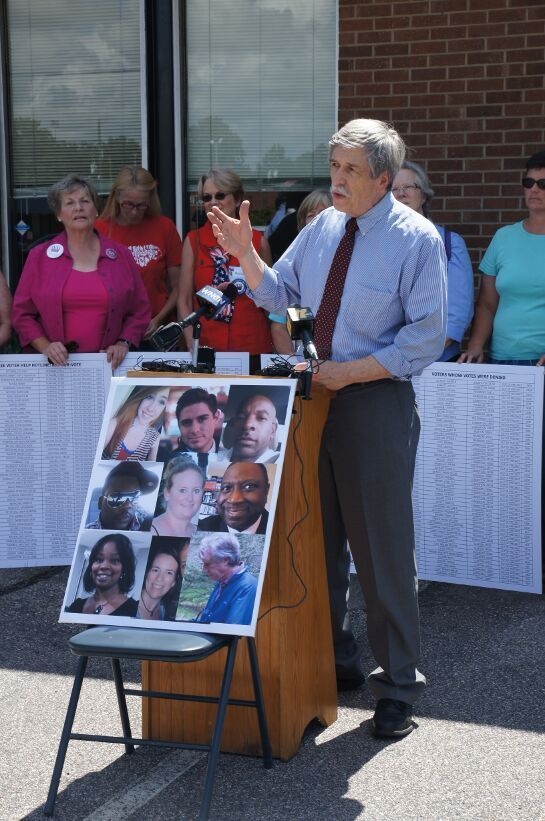NC 'monster' election law disenfranchised more than 450 primary voters, report finds

More than 450 North Carolina citizens whose votes would have counted in the 2012 election had their ballots rejected during this year's primary due to election law changes made last year by the Republican-controlled legislature. Those disenfranchised were disproportionately African Americans and Democrats, lending support to claims that the new law is discriminatory.
Those are among the findings of a new report by the voting rights watchdog group Democracy North Carolina, which analyzed provisional ballots cast in this year's primary. The analysis focused on provisional ballots rejected due to two recent changes in state voting rules: one ending same-day registration and the other requiring election-day ballots to be cast in one's own precinct. Bob Hall, the group's executive director, interviewed a dozen of the affected voters to gather more details about what happened.
"I was blown away, I have to say," Hall said at a Sept. 10 press conference outside the state elections board, referring to what he heard from voters whose ballots were rejected.
Take the case of Craig Thomas of Granville County, North Carolina. After serving with the U.S. Army in Afghanistan for 18 months, Thomas went to an early voting site in April only to be told there was no record of registration for him -- even though he had been registered before being deployed, returned to the same address after his service, and was never notified that his registration was canceled. Under the old law, Thomas could have used same-day registration to register at the early voting site and cast a ballot on the spot. Instead, he had to use a provisional ballot that wasn't counted.
Then there's the case of Ashley Gragg of Yancey County, who was assigned to work as an assistant judge at a precinct other than her own on Election Day. Because she was on vacation during early voting, she had to vote on Election Day -- but she couldn't leave her assigned polling place. She filled out a provisional ballot there, but under the new law it didn't count.
The analysis found that those affected by the changes in the law came from all walks of life: young and old, black and white, men and women, Democrats, Republicans and unaffiliated voters.
"These are the actual victims of the changes in the law," Hall said.
But not all groups were victimized equally: While African Americans make up 22 percent of registered voters in North Carolina, they accounted for 39 percent of the 454 voters disenfranchised in the primary because of the rule changes. And Democrats make up 42 percent of the state's registered voters but represented 57 percent of those disenfranchised by the new law, which also shortens the early-voting period and requires photo ID to vote beginning in 2016.
Hall pointed out that the law prevented hundreds of people from having their ballots counted in the primary in order to address concerns over a handful of cases of fraud. Between 2000 and 2012, according to a state elections board report, North Carolina had only two documented cases of voter impersonation fraud -- the type addressed by the state's voter ID law.
Passed last year by the Republican-controlled legislature and signed by Gov. Pat McCrory (R), North Carolina's new voting law has been dubbed a "monster" by Democracy North Carolina and other voting rights advocates because of the sweeping changes it made and its restrictiveness. Several lawsuits have been filed to challenge the law, and voting rights advocates are now seeking to block it from being enforced for this year's general election.
Last month a federal judge ruled that the upcoming elections should go forward under the new law, but opponents of the law appealed to the 4th U.S. Circuit Court of Appeals, which this week agreed to expedite the appeal and scheduled arguments for Sept. 25 in Charlotte.
In the meantime, Hall and other voting rights advocates are urging North Carolina citizens to be prepared to vote under the new law. That means they have until Oct. 10 to register to vote at their current address. And if they skip early voting and wait until Election Day on Nov. 4 to cast their ballot, they must ensure they vote in their home precinct to have their ballot count.
"Don't let politicians decide who should vote," Sarah Preston of the ACLU of North Carolina said at the press conference.
Tags
Sue Sturgis
Sue is the former editorial director of Facing South and the Institute for Southern Studies.
